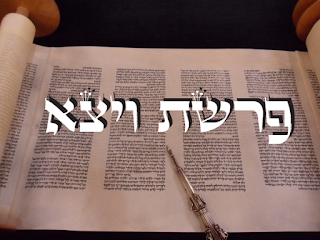Parashat Lech Lecha - Genesis 12:1-17:27 - "Abraham's Tent" - Weekly D'var Torah From Rabbi John Ludemann
By Rabbi John Ludemann, BTh.
Week#3 Abraham: A Father we all share.
This week we meet Abram (Soon to be Abraham)(Genesis 12:1-17:27)
The portion in Hebrew is called “Lech Lecha” which is founded in the beginning of the verse of Genesis 12:1. Lech Lecha literally means “Go Out (from your father’s house) and Go In (to the land that I will show you)”. In other words, G-D wants Abram to GO OUT of his comfort zone and GO INTO a place where we can find ourselves and ultimately find the Creator.
Now, unlike Noah (see week #2), Abram doesn’t just leave by himself, but goes out (so says the Oral Tradition) and speaks of his calling and a multitude leave with him. Abram and Sarai (soon to be Sarah) go into Canaan (to be Israel in 4 generations) and eventually Abram encounters G-D in a vision.
Week#3 Abraham: A Father we all share.
This week we meet Abram (Soon to be Abraham)(Genesis 12:1-17:27)
The portion in Hebrew is called “Lech Lecha” which is founded in the beginning of the verse of Genesis 12:1. Lech Lecha literally means “Go Out (from your father’s house) and Go In (to the land that I will show you)”. In other words, G-D wants Abram to GO OUT of his comfort zone and GO INTO a place where we can find ourselves and ultimately find the Creator.
Now, unlike Noah (see week #2), Abram doesn’t just leave by himself, but goes out (so says the Oral Tradition) and speaks of his calling and a multitude leave with him. Abram and Sarai (soon to be Sarah) go into Canaan (to be Israel in 4 generations) and eventually Abram encounters G-D in a vision.
That vision (Genesis 15:7-20) G-D ratifies a covenant that all those who point to Abram as their father (that is what Abram means “exalted Father”) will be part of that covenant.
Every Monotheistic Religion owes their Monotheism to this Covenant. A few interesting things here, in a Bedouin covenant there are two parties that walk through this split open carcasses. Traditionally, when such a covenant is made, each party goes between the dead animals and declares “If I break my covenant with the other party, may ‘THIS’ (what is spilt animals on the ground) happen to me”. This doesn’t happen in the case of the Abrahamic Covenant. In Genesis 15: 17-20 only G-D walks through the split animals, and not Abram.
This makes the Covenant Eternal!
G-D will never renege on his promise (Numbers 23:19), so it is unbreakable.
G-D does return to make sure those who are part of Abraham’s covenant are marked, by circumcision (Genesis 17:9-14). One final thing happens to Abram and Sarai, a name change. The Sacred Name of G-D which is Y-H-V-H, some pronounced it as “Jehovah”. To add an additional aspect to this Eternal Covenant, G-D shares HIS name with Abram and Sarai. G-D Places the middle “H” or Hei as it is pronounced in Hebrew, in Abram’s Name making him Abra”H”am and the last “H” of G-D’s Name on Sarai to make it Sara”H”. By sharing G-D’s name with them changes the meaning of their names. Sarai means “Lady” now with the Hei makes it “G-D’s Matriarch”. Abram means “Exalted Father” with the Hei becomes “G-D’s Exalted father (of many nations)” All those who take on the Abrahamic covenant takes on not only an eternal covenant, but takes on the G-D’s great calling to go beyond ourselves and encounter the Living G-D.
Next week we meet Abraham and the Angels.



Comments
Post a Comment